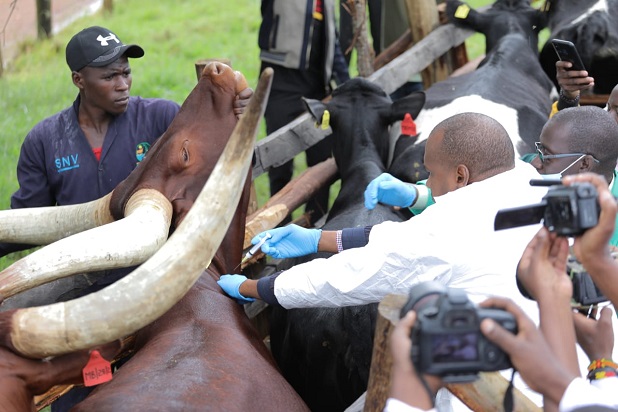The trials for the anti-tick vaccine kicked off in October 2022
On October 27, 2022, the Government of Uganda officially flagged off NARO’s anti-tick vaccine for on-farm field trials at Mbarara ZARDI, Isimba Prison Farm in Masindi district, Kiburara Prison Farm in Ibanda district, Maruzi Research Station in Apac district, and Nabuin ZARDI in Nabilatuk district. These locations represent the Pastoral Rangelands, Western Highlands, Lake Albert Crescent, Mid-North Savannah Grasslands, and Karomaja Drylands Agro-Ecological Zones respectively. The exercise is expected to take 365 days (one year).
Speaking at a Bio café meeting on Friday at Fairway Hotel in Kampala, the Principal Research Officer at the National Agricultural Research Organization ( NARO), Dr. Fredrick Kabi said the cattle that have been vaccinated with the anti-tick vaccine have exhibited improved body condition score.
“After 180 days, they will get booster dozes. We are doing monthly data collection but the animals are looking healthier. So far, no serious adverse effects associated with the vaccine has been recorded. 15 cases of clinical tick borne diseases have successfully been managed. We have not seen any tick which is not succumbing to our vaccine,” Dr. Kabi said while giving an update on the field trial exercise.
With the data being collected monthly, Dr. Kabi says the researchers are looking for traces of the vaccine in milk, blood and dung.
Dr. Kabi adds that while vaccine is effective, farmers want to see ticks falling off soon after applying it yet vaccines take time to work. According to Dr. Kabi, vaccines help animals develop anti-bodies which in term helps them kick out ticks.
In an exclusive interview with Business Focus on the sidelines of the event, Dr. Kabi said the field trials have shown that ticks are either dying or falling off the experimented animals after two weeks. He also revealed that the vaccine is at the commercialization phase after the President supported the processes of acquiring machines for manufacturing the vaccine.
Upon the successful conclusion of the trial, the anti-tick vaccine will be available and ready for scaling up for use by livestock farmers, saving the country from an annual economic loss of over Shs3.8 trillion caused by ticks and tick-borne diseases. Currently, livestock farmers are spraying their animals every week, but with the vaccine, they will spray twice every six months. The injectable vaccine has given promising results against brown, blue and red ticks.





